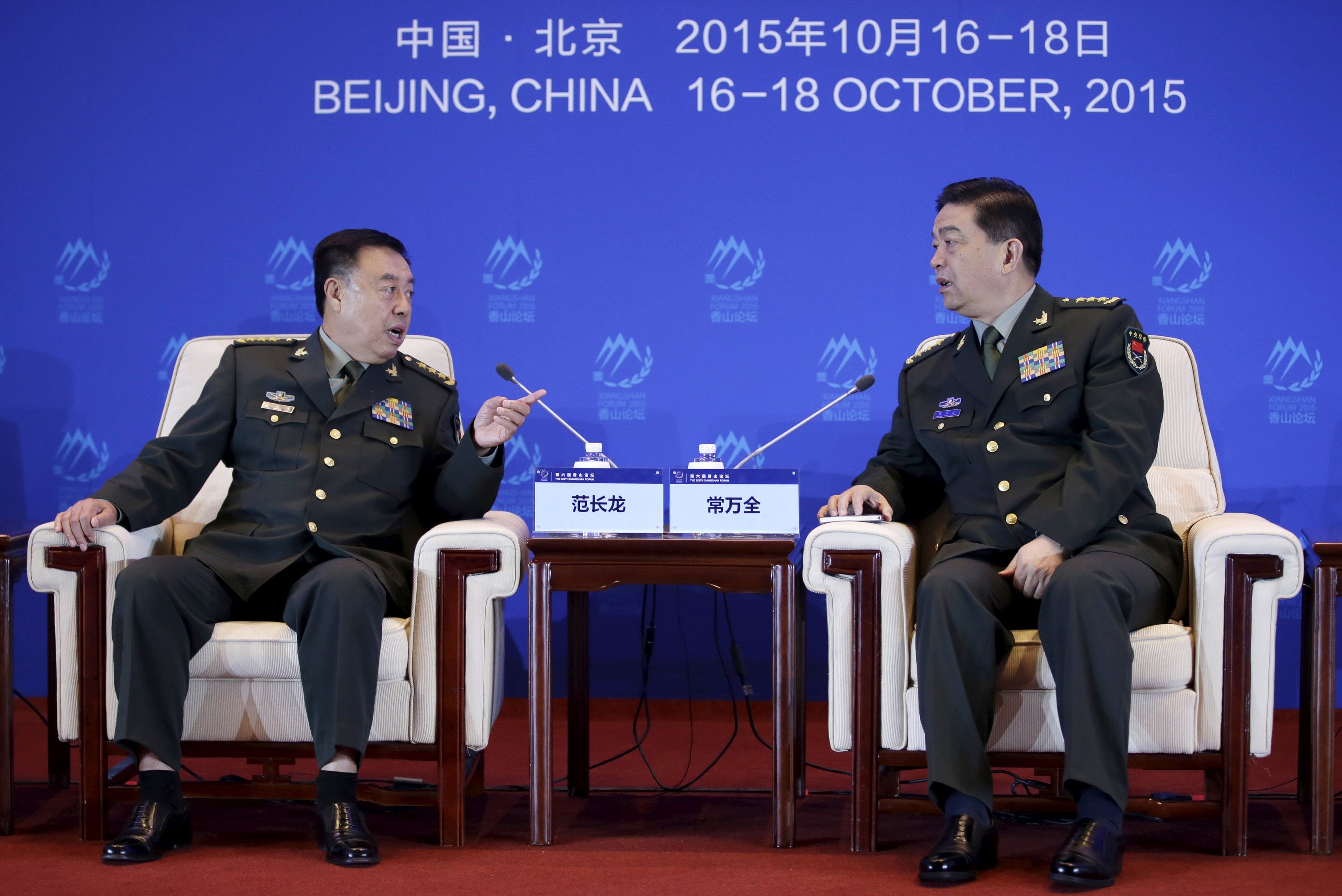BEIJING • After a series of provocative actions - reclaiming land, hauling oil rigs to disputed seas - that heightened security concerns, China last week launched a new offensive. This time, though, there was more talk than action, and of the sort designed to dial down tensions.
In hosting the first informal meeting of China-Asean defence ministers at the Xiangshan Forum, China has shown a keenness to better engage the region in fostering mutual understanding and trust, and, hopefully, deeper cooperation.
For sure, the defence summitry is one part of a multi-pronged approach in handling relations with its neighbours, some of whom it has territorial disputes with. But there are net positives that China, especially its military, is willing to be more open and to interact with the world on its own soil.
China's frustration at being criticised at regional forums over its military might and handling of maritime disputes prompted a search for its own platforms to shape the narrative on Asian security issues and ensure its voice is heard.
Stepped-up engagement efforts by strategic rivals such as the United States also made China realise the importance of strengthening its own interaction with Asean states.
Beijing proposed an informal Asean-China defence ministers' meeting in October 2013, after Washington floated a similar idea that year, and went on to host the first such informal defence meeting in Hawaii in April last year.
Following Japanese Prime Minister Shinzo Abe's criticisms of China's handling of South China Sea disputes at the annual Shangri-La Dialogue (SLD) in Singapore last year, China upgraded its own Xiangshan Forum in November, in a move seen as a counter to the SLD.
Xiangshan began in 2006 as a biennial Track 2 non-governmental meeting. With its elevation, which saw the China Institute for International Strategic Studies roped in as a co-organiser alongside the China Association for Military Science, the forum is now an annual semi-government affair also involving ministerial-level officials.
Last week's sixth Xiangshan Forum justified China's efforts, drawing around 500 participants from some 60 countries, including 14 defence ministers. Fourteen countries, among them the United States, Japan, Britain and Indonesia, each sent an official delegation for the first time.
In contrast, six defence ministers were among some 300 officials and academics from 47 countries who attended last year's forum.
A look at the Xiangshan Forum's programme schedule showed its three-day format was almost identical to that of the SLD. Chinese delegates who have been to the SLD clearly studied and replicated its format for Xiangshan.

Singapore and the SLD's organiser, the International Institute for Strategic Studies (IISS), have reason to cheer. Imitation, it has often been said, is the best form of flattery.
But more importantly, the SLD-like format allowed free-flowing and frank discussions - a key appeal of the Singapore event - to emerge at Xiangshan, which can only be a good thing for the region.
Observers who have attended both events told The Straits Times that the quality of discussions was comparable.
Credit should go to the Chinese organisers for not shying away from inviting participants known to speak freely and critically of China's defence and foreign policy and for not denying them the opportunity to make their points.
For instance, retired US admiral Gary Roughead, who took part in a panel discussion, criticised China's construction work in the South China Sea as a move to militarise the region. His remarks were, predictably, rebutted by Chinese delegates.
At the informal China-Asean defence meeting last Thursday and Friday, Beijing ensured that it produced tangible outcomes by agreeing to joint naval drills in the South China Sea covering unplanned encounters as well as search-and-rescue efforts as part of a five-point confidence-building consensus.
Organising a security dialogue on its own soil brings added advantages to both China and participants.
The China-Asean meeting and Xiangshan Forum gave foreign delegates more opportunities to interact with and hear directly from China's top military brass.
General Fan Changlong, vice-chair of the Central Military Commission (CMC) that controls the People's Liberation Army, spoke at the Xiangshan Forum last Saturday. Former defence minister and former CMC member Liang Guanglie remains the highest-ranking official to attend the SLD in 2011.
Chinese citizens also got to find out what others said about their country's actions, and how their leaders handled sensitive issues, which could help temper domestic nationalistic sentiments.
China deserves praise for its stepped-up engagement, given that it faces some risks in doing so.
Gen Fan was reportedly criticised for saying at Xiangshan that China has "always advocated dealing with disputes through peaceful means and will not use violence recklessly, even if it comes to territory and sovereignty". Netizens saw his remarks as being too weak, which prompted the Global Times tabloid, known for its nationalistic stance, to go to the general's defence.
IISS senior fellow William Choong told The Straits Times that the latest Xiangshan Forum marked a step forward by China in entertaining and also listening to views that are not congruent with the Chinese narrative.
"It reflects a growing maturity on China's part," he added.
China's defence summitry could pose challenges for Asean's central role in Asian security affairs through the Asean Regional Forum and Asean Defence Ministers' Meeting-Plus (ADMM-Plus). The SLD's status as Asia's premier security forum may also come under threat if Xiangshan grows in influence.
But both concerns may be premature and unfounded, say analysts.
First, despite China's hopes to host more informal defence meetings, a statement from Singapore's Defence Ministry said "Asean ministers pointed to the ADMM-Plus as the key platform for strengthening practical cooperation between Asean and its key extra-regional partners which include China".
Chinese officials have also insisted that Xiangshan is not aimed at displacing the SLD.
Mr Prashanth Parameswaran, a regular columnist for The Diplomat website, said that increased Xiangshan participation should be viewed positively as it suggests a willingness by other countries to "engage with new institutions and shape them where possible before letting them rise or fall on their own merits".
"The US and other actors should display both comfort in initially considering the new ideas of others which they might disagree with, as well as confidence in existing ones which they have long been wedded to," he told The Straits Times.
Still, China should not mistake progress at its defence summitry as endorsement of its assertive stance on maritime disputes. And it should bear in mind that talk must be accompanied by complementary actions that deepen trust and cooperation, instead of contradictory actions that heighten risks of conflict.
The region could do with more of China's charm offensive through the defence summitry.

